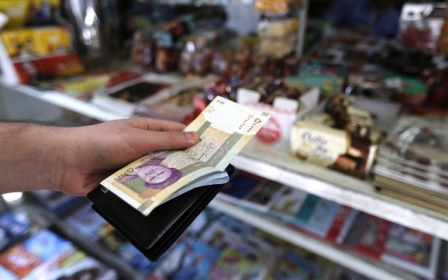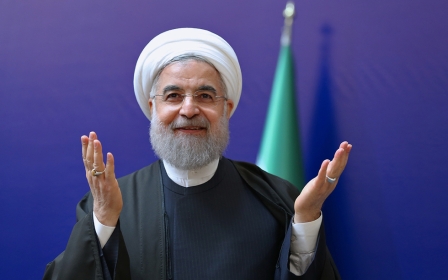US announces sanctions against Iranian paramilitary force

The United States has imposed fresh sanctions on a network of businesses it says provide financial support to an Iranian paramilitary force.
Announced on Tuesday, the US Treasury said the sanctions would affect a network of businesses tied to the Basij Resistance Force, a group that the US department said works with Iran's Islamic Revolutionary Guard Corps (IRGC).
"The international community must understand that business entanglements with the Bonyad Taavon Basij network and IRGC front companies have real world humanitarian consequences," US Treasury Secretary Steven Mnuchin said in a statement.
The sanctions were imposed on Bank Mellat, Mehr Eqtesad Bank, Mehr Eqtesad Iranian Investment Co and five other investment firms, the Treasury said.
Iran Tractor Manufacturing Co, the Middle East's largest tractor manufacturer, and Esfahan's Mobarakeh Steel Co, the largest steelmaker in the Middle East and North Africa region, are also affected.
In its statement, the Treasury said the network of companies "provides financial infrastructure to the Basij's efforts to recruit, train, and indoctrinate child soldiers who are coerced into combat under the IRGC's direction".
The move comes two weeks before Donald Trump's administration is expected to reimpose some of the US's harshest sanctions against Iran, including its oil sector. That set of sanctions is set to come into effect on 4 November.
Heated rhetoric
In May, the US pulled out of the 2015 nuclear deal that Iran signed with world powers, under which it agreed to curb its nuclear programme in exchange for a lifting of international sanctions.
Since that time, the US president and key officials within his administration have repeatedly voiced their opposition to negotiating with Tehran, a position that pits Washington against several of its key European allies, which remain committed to the 2015 agreement.
Earlier this month, the United Nations's top court ordered the US to ensure that sanctions against Iran do not impact humanitarian aid or civil aviation safety.
Iran had argued that sanctions imposed since May by the Trump administration violated the terms of a 1955 treaty of amity, economic relations and consular rights between the two countries.
Following the International Court of Justice's decision, US Secretary of State Mike Pompeo announced the US would terminate the little-known treaty.
He said the United Nations court had no jurisdiction over US sanctions, which Pompeo said were essential to the country's security interests.
"This is a decision, frankly, that is 39 years overdue," Pompeo told a news conference at the time. "Iran is abusing the ICJ for political and propaganda purposes and their case, as you can see from the decision, lacked merit."
Iranian Foreign Minister Mohammad Javad Zarif, meanwhile, said the US decision demonstrated it was an "outlaw regime".
"Today US withdrew from an actual US-Iran treaty after the ICJ ordered it to stop violating that treaty in sanctioning Iranian people. Outlaw regime," Zarif wrote on Twitter.
Middle East Eye propose une couverture et une analyse indépendantes et incomparables du Moyen-Orient, de l’Afrique du Nord et d’autres régions du monde. Pour en savoir plus sur la reprise de ce contenu et les frais qui s’appliquent, veuillez remplir ce formulaire [en anglais]. Pour en savoir plus sur MEE, cliquez ici [en anglais].



